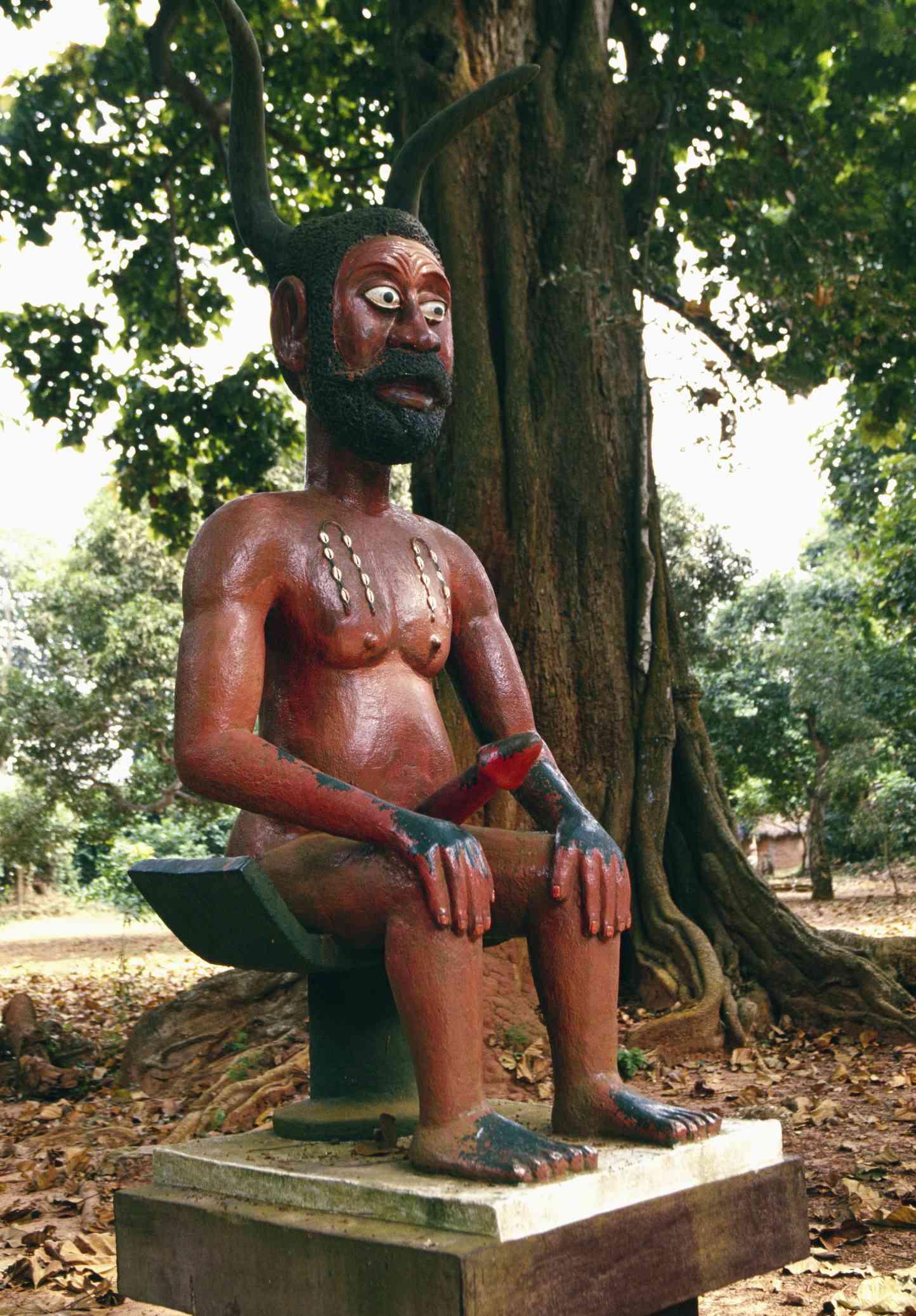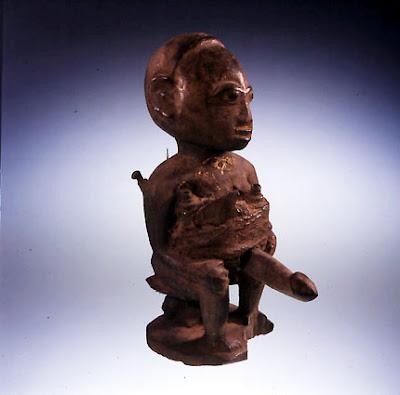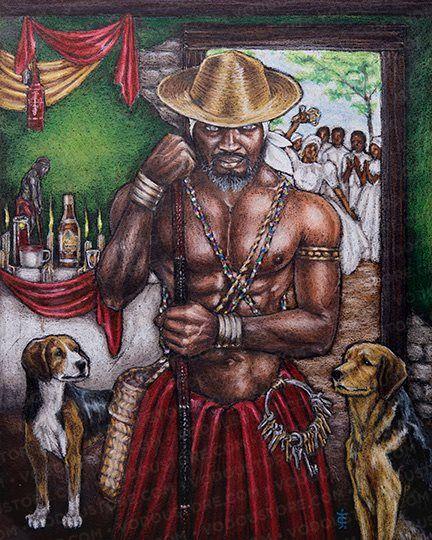
Introduction
In the spiritual traditions of the Fon people of Benin and the Ewe people of Togo and southeastern Ghana, mythology is deeply woven into the fabric of daily life. At the heart of their belief system lies a complex pantheon of deities known as Vodun or Voodoo, each with distinct powers and domains. Among them, one figure stands as the gateway between the physical and spiritual realms: Legba. Revered and sometimes feared, Legba is a deity of paradoxes, a trickster, a guide, a protector, and a challenger. This article explores the origin, nature, roles, stories, and significance of Legba in Fon and Ewe cosmology, shedding light on how one god embodies the bridge between the divine and the human.
Origins And Identity Of Legba
Legba is one of the eldest and most important orishas (deities) in the Vodun religion. In Fon and Ewe belief, Legba was created by Mawu-Lisa, the supreme divine twin force (Mawu, the moon and feminine; Lisa, the sun and masculine). Legba is seen as the divine linguist and gatekeeper to all other gods. He holds the keys to communication, destiny, and access to the spirit world. Without his permission, no sacrifice, ritual, or prayer can reach the higher deities. His presence is considered essential at the beginning of every Vodun ceremony.
- Legba as the Tricster and Tester: While Legba is a facilitator of divine connection, he is also famous for being a trickster figure and tester. In many myths, Legba uses cleverness, humor, or mischief to challenge humans and even other gods. He is not evil, but rather uses his unpredictability to teach lessons, expose hypocrisy, and punish arrogance. In one popular Fon myth, a wealthy farmer who lived in arrogance and pride sought the gods' blessings for greater wealth. He ignored village elders, disrespected traditions, and never offered proper sacrifices. When he finally approached the Vodun priests, he demanded direct access to Mawu-Lisa for a miracle. The priests warned him that no communication with the divine is possible without Legba, but the man insisted. That night, Legba appeared to him at a crossroads in disguise as a poor beggar, asking for food. The farmer scoffed and pushed him aside. The next morning, his wealth began to vanish (his crops failed, animals died mysteriously, and illness entered his home). Only when he returned to the shrine, confessed his pride, and offered a sincere sacrifice to Legba, did peace return to his life. The myth teaches that humility, respect, and following spiritual order are essential before any divine favor. Trickster figures like Legba are found in many world mythologies, but Legba stands out for being both playful and deeply wise. His lessons are often hidden in confusing or difficult experiences, which later make sense in hindsight.
- Guardian Of Crossroads And Doors: Legba is most often associated with crossroads and doorways-literal and symbolic. In every Fon and Ewe village, a shrine to Legba is placed at the entrance. This reflects his role as the threshold deity, guarding transitions, changes, and boundaries. He is also known to dwell in in-between spaces: dawn and dusk, youth and adulthood, waking and dreaming. Whenever a person stands at a "crossroads" in life, metaphorically or spiritually, they are said to be in Legba's domain.
Symbols And Representations
Legba has several sacred symbols. Crossroads (representing choice, connection, and transition), keys (access to the spirit world), dogs (companions to the spirits and symbols of loyalty and danger), phallus (fertility and creation), and staff or stick (used to open spiritual paths). He is often represented by a small statue with a prominent phallic feature or with a face painted in black, white, and red. Offerings at his shrines include palm oil, kola nuts, tobacco, and cooked food.

Legba In Ritual And Worship
In Vodun rituals, Legba is always the first deity to be called. Without him opening the gate, no other orisha will respond. Priests and devotees begin ceremonies by greeting Legba, asking him to clear paths and allow communication with the spirits. Drumming, dancing, and chanting are used to invoke him. Possession is also a common part of Vodun worship, and when Legba possesses someone, he is known for laughing, dancing, speaking in riddles, or asking tricky questions. He is believed to speak all human languages. When enslaved Africans were taken to the Americas, they carried Legba with them. In Haitian Vodou, he is known as Papa Legba, the gentle old man with a cane and straw hat who opens the gate to the spirit world. In Louisiana Voodoo and Brazilian Candomblé, he also appears in various forms. Though his appearance and names may vary, he always plays the role of intermediary and gatekeeper.

Morality, Justice, and Spiritual Lessons
Legba teaches that life is not always straightforward. Through confusion, delay, or challenge, he forces humans to reflect, grow, and act wisely. His trickery is often a mirror to our flaws. He rewards truth, punishes lies, and protects the spiritually aware. In the Fon and Ewe worldview, this means you must respect the gods, act with integrity, and be humble before the unknown. Legba is a complex and vital figure in Fon and Ewe mythology. He is the doorway to the divine, the voice between worlds, and the spirit who makes us question ourselves. In both his trickster and guiding roles, he reflects a profound spiritual truth: that wisdom, justice, and connection to the divine are only accessible to those willing to learn, grow, and walk humbly at the crossroads.
References
- Blier, Suzanne Preston. African Vodun: Art, Psychology, and Power. University of ChicagoPress, 1995.
- Rush, Dana. “Ewe and Fon Religious Beliefs and Practices.” World Religions and SpiritualityProject, Virginia Commonwealth University.
- Brown, Karen McCarthy. Mama Lola: A Vodou Priestess in Brooklyn. University of CaliforniaPress, 2001.
- Oral interviews and fieldwork collected from Vodun practitioners in Togo and Benin(2018-2023).
Photo credit: Pinterest and Google
Join the Oriire Community
Become a free member to bookmark your favorite stories, join the discussion and personalize your experience.

















Share
0 Comments